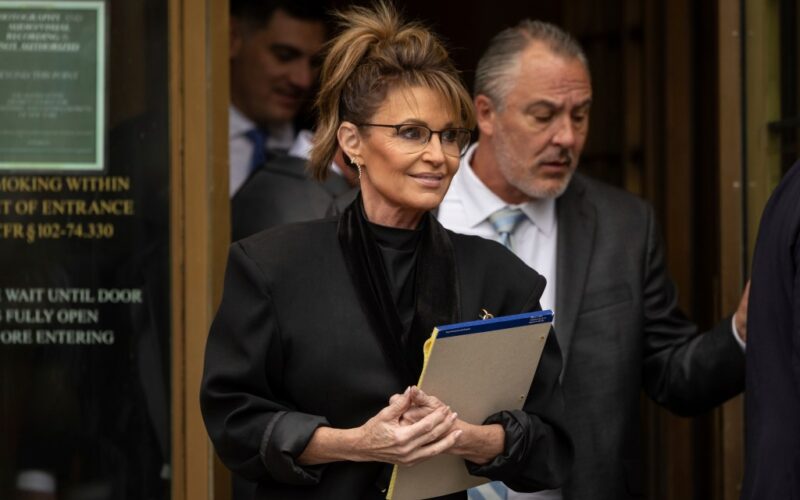Former Alaska governor and Republican firebrand Sarah Palin was back in court Monday for a do-over in her defamation case against The New York Times.
A jury was selected to hear the case in Manhattan Federal Court, with opening statements set to begin Tuesday. After Palin initially lost her case in February 2022, a federal appeals court in August ruled that it should be heard at a retrial as “several major issues” had tainted the first.
The suit centers on a 2017 editorial that ran in The Times titled “America’s Lethal Politics,” which examined the impact of heated political rhetoric on gun violence in the U.S. in the wake of a gunman opening fire at a congressional baseball game and wounding Rep. Steve Scalise (R-La.).
It made a connection between Palin’s campaign literature and the 2011 shooting of former Rep. Gabrielle Giffords (D-Ariz.), in which Giffords was partially paralyzed and six people were killed. The Times’ former editorial board editor, James Bennett, who testified at the 2022 trial, added details to the writer’s piece, including an inaccurate aside about an old graphic put out by Palin’s political action committee, saying it showed “Giffords and 19 other Democrats under stylized crosshairs.”
But the graphic showed electoral districts in crosshairs, not individual politicians. The article was corrected less than a day after it went up, but Palin later filed suit, arguing the first pass damaged her political career.
While jurors were deliberating, Manhattan Federal Judge Jed Rakoff granted a motion from the newspaper to dismiss the case, finding evidence proved the error was an example of “very unfortunate editorializing,” but not defamation.
The following day, jurors separately concluded that the newspaper should not be held liable for defamation. It later transpired that they had learned of Rakoff’s ruling from push alerts during deliberations.
In addition to citing jurors’ knowledge of the judge’s ruling, the 2nd Circuit federal appeals court in August also found that Rakoff, who will preside over the retrial, wrongly instructed them about what Palin was required to prove and excluded certain evidence.
First Amendment advocates have warned that the case has the potential to upend decades of legal precedent if Palin ultimately gets it before the Supreme Court. Justices Clarence Thomas and Neil Gorsuch have expressed interest in overturning the 1964 ruling it hinges upon in New York Times vs. Sullivan, which restricts public officials’ ability to sue journalists for mistakes.
“This case revolves around a passing reference to an event in an editorial that was not about Sarah Palin. That reference contained an unintended error that was corrected within 18 hours,” Times spokesman Charlie Stadtlander said in a statement. “We’re confident we will prevail and intend to vigorously defend the case.”
Lawyers for Palin did not return calls seeking comment.








